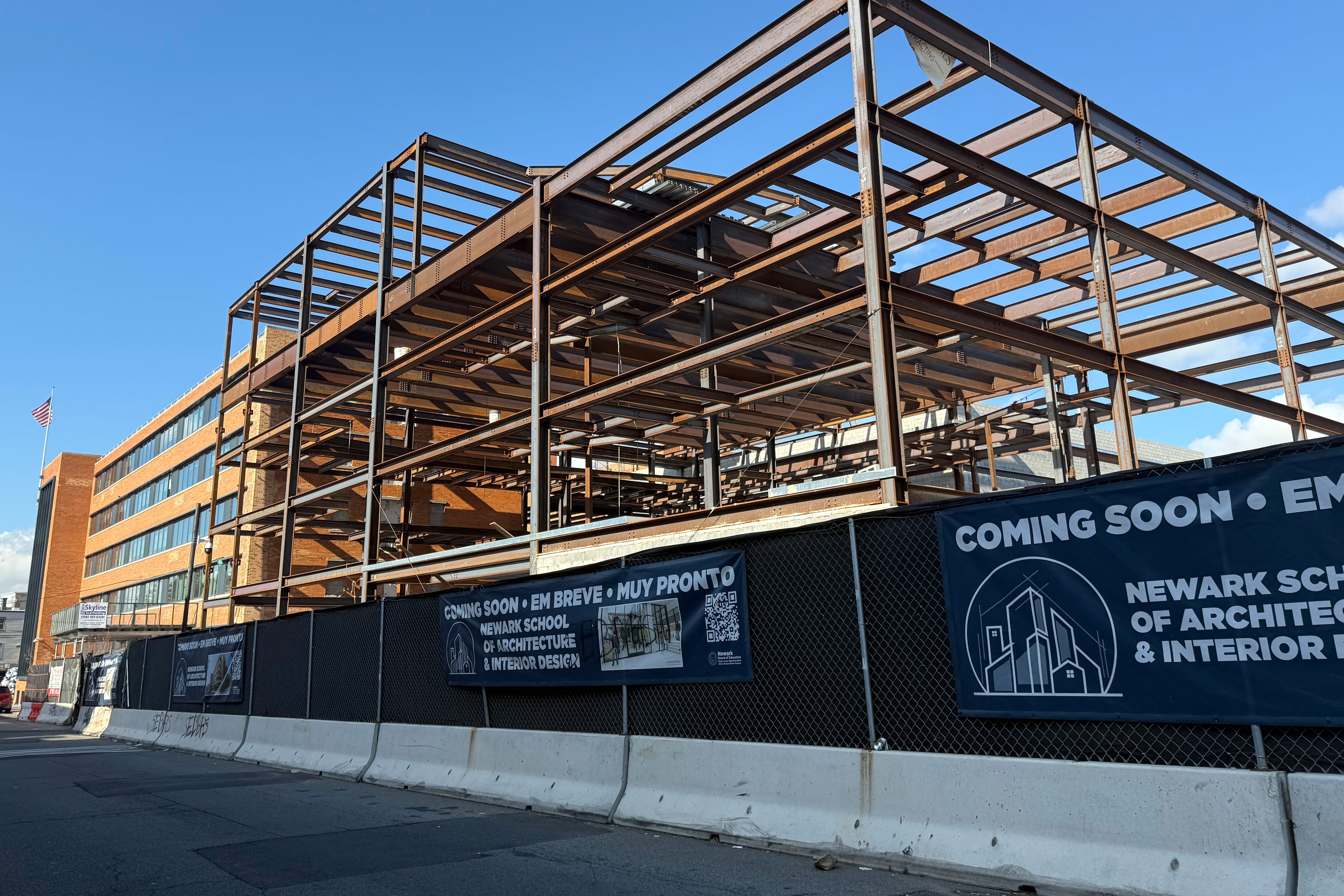Sign up for Chalkbeat Newark’s free newsletter to get the latest news about the city’s public school system delivered to your inbox.
On the first day of classes for Newark Public Schools on Tuesday, students dressed in dark blue polo shirts walked through the doors of the Newark School of Architecture and Interior Design, marking the long-awaited opening of the district’s newest campus after a three-year delay.
Dozens of students and their families walked down Jefferson Street to reach the entrance of the high school, located in the heart of the city’s East Ward neighborhood, an area with a high number of Portuguese- and Spanish-speaking families. Students walking to school passed by the construction site of the school’s new gym and auditorium, slated for completion by June 2026. Cars lined up on the side of the school as students said quick goodbyes to their parents before running to the entrance.
One mom kissed her daughter and blessed her with the sign of the cross. Another gave her son a tight hug before he walked through an archway of blue, white, and silver balloons, representing the school colors.
The school opens with a freshman class of 240 this year, marking a significant milestone for the district and students starting their high school journeys. The district plans to add a grade level each year.
Kendrick Thomas, one of the students walking to the new high school, carried his summer reading assignment, a poster explaining 1960s pop culture that he created after reading “The Outsiders” by S.E. Hinton. Thomas is excited to start high school and plans to specialize in the HVAC track, one of three specialties students can choose to study.
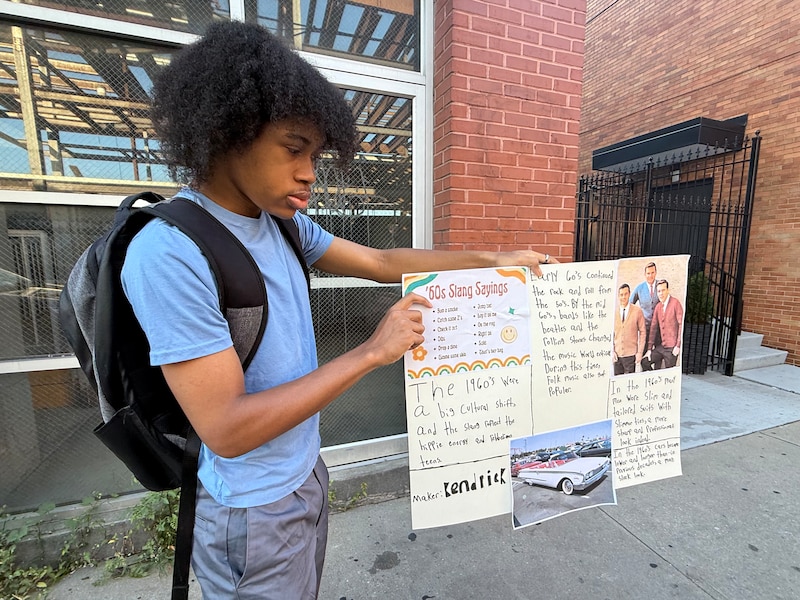
“I chose that because I think I’m good with my hands and, like, it sounded interesting and different,” said Thomas, as he rushed to get to school before the bell rang at 8:15 a.m.
Aside from the HVAC track, the School of Architecture also offers students a chance to specialize in plumbing and electrical trades, while also exploring architecture and interior design. According to district officials, the program will enable students to graduate with both a high school diploma and a trade license.
The new high school is housed in the Ironbound neighborhood at the former St. James Hospital building, which had stood vacant for years before being repurposed. The school was scheduled to open in the fall of 2022, but stop-work orders issued by the state’s Labor Department over wage complaints and changes in contractors delayed the project.
Superintendent Roger León was at the school early Tuesday to greet students, who were among the roughly 40,000 Newark Public Schools students returning to classrooms. He waved to parents driving past the school and shook hands with kids eager to start their first day of classes in a new building.
One mother, who asked to be identified as Maria due to fears of immigration enforcement, said her son, who has a disability, felt nervous to start high school, let alone a new school. But after attending freshman orientation and meeting with teachers and the school’s principal, Soraia Mendes, he was put at ease. The mother hopes León and district leaders will boost efforts to help students with disabilities and better communicate with parents.
“I just hope he gets the academic support he needs,” said Maria in Spanish to Chalkbeat on Tuesday.
Across the street, at the intersection of Congress and Lafayette Streets, cars swerved around pedestrians and honked at each other. A crossing guard held a stop sign as a mom and her three children navigated the busy intersection to reach Lafayette Elementary School. A group of siblings held each other’s hands as they ran down the block and into the elementary school building.
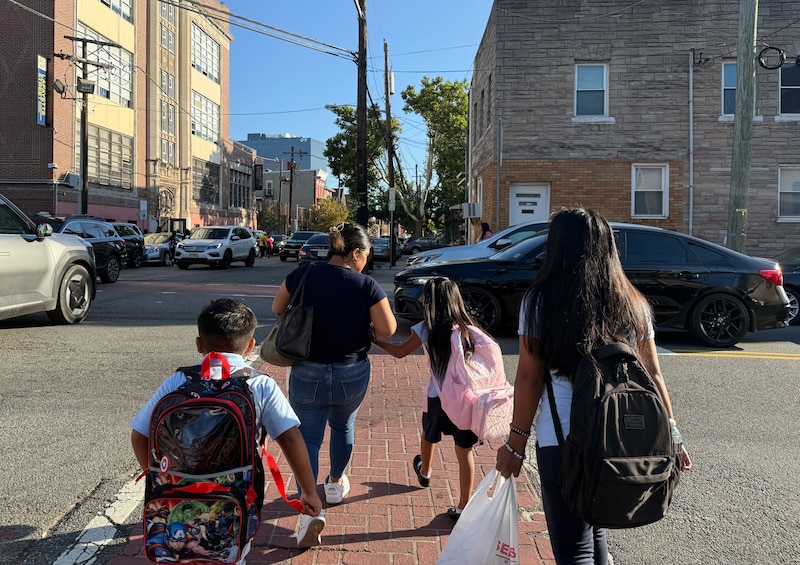
In addition to the opening of the new high school, the 2025-26 school year brings other significant milestones, as well as challenges for the state’s largest public school system.
This school year marks the district’s fifth year under local control after 25 years of state takeover. It also marks the fifth year of León’s 10-year strategy, known as “The Next Decade: 2020-30,” an ambitious plan aimed at tackling learning loss, implementing new curriculums, addressing emerging issues, and adding more teachers, among other goals.
León’s contract is also under consideration for an extension through 2030, which would make him the longest-serving superintendent in New Jersey. The Newark school board has scheduled a public hearing on Sept. 25 to discuss and vote on the proposal.
This school year, district leaders must also address a host of concerns, such as how to support the growing needs of schools as student enrollment increases, manage district finances, tackle transportation issues, expand academic recovery efforts, fix the district’s aging buildings, and assess the effects of anti-Blackness following concerns of racial harassment at a city high school. The district is also expanding AI technology to support student learning and identify struggling readers.
This spring, the Newark school board approved a $1.57 billion budget that included more money for teachers, school renovations, and an increase in charter school payments as district leaders said they budgeted conservatively in light of potential changes to federal funding.
What’s new this school year?
Newark Public Schools will implement new state mandates this year as it works to boost student performance and address other issues. Since 2022, the first year New Jersey students took the state standardized tests since 2019 due to remote learning, standardized test scores have pointed to student difficulties in writing and English language arts.
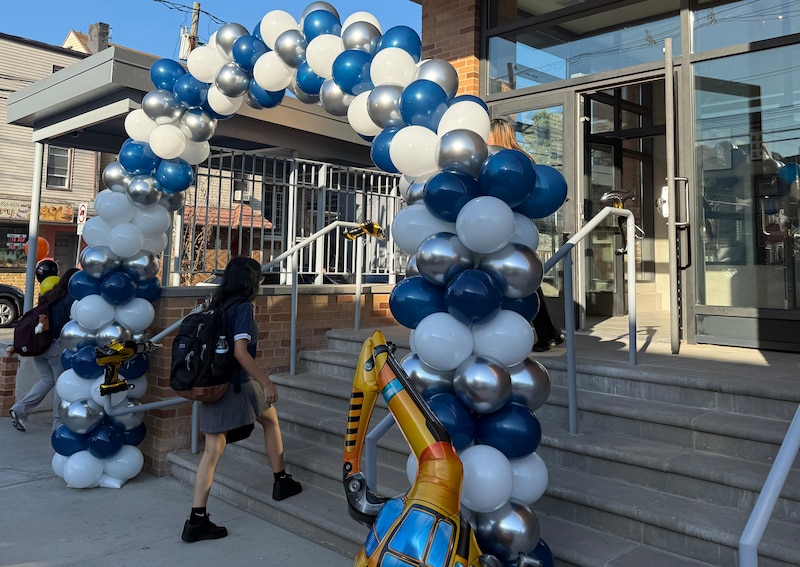
In response, New Jersey this fall is launching its new Literacy Framework, which requires public school districts to screen students in grades K-3 for reading difficulties. In Newark, schools will use Amira Learning, an AI-powered tool, as a universal screener to assess students’ ability to read, sound out words, and identify areas needing support.
The state is also introducing a new “adaptive” version of its standardized tests this school year, in which the difficulty of test questions is adjusted based on student responses, according to NJ Spotlight.
León has also said the district is experiencing a growth in student enrollment, which has prompted the opening of new schools and grade-level expansion in others. This fall, Nelson Mandela Elementary School expands to grade 5, Michelle Obama and Sir Isaac Newton Elementary schools expand to grade 6, Ironbound Academy expands to grade 7, and East Ward Elementary School expands to grade 8, according to the district.
The boost in enrollment prompted the district in March to budget for 53 new positions consisting of 20 teachers, 11 aides, and 23 school support staff. It also allocated an additional $1.4 million to support the expansion of schools and an extra $8.1 million to accommodate an additional 1,600 students in the upcoming school year, according to this year’s budget.
The district is also expecting an increase in the number of and English language learners and students with disabilities who require special education services.
Historically, Newark has struggled to implement programs and support for students with disabilities. At the beginning of last school year, some of those students missed class due to enrollment issues that left parents scrambling to find solutions. Students with disabilities also face greater learning challenges as they have been some of the hardest hit by the fallout from the COVID-19 pandemic.
The district has not released data on the number of bilingual and special education teachers it has hired for the upcoming school year.
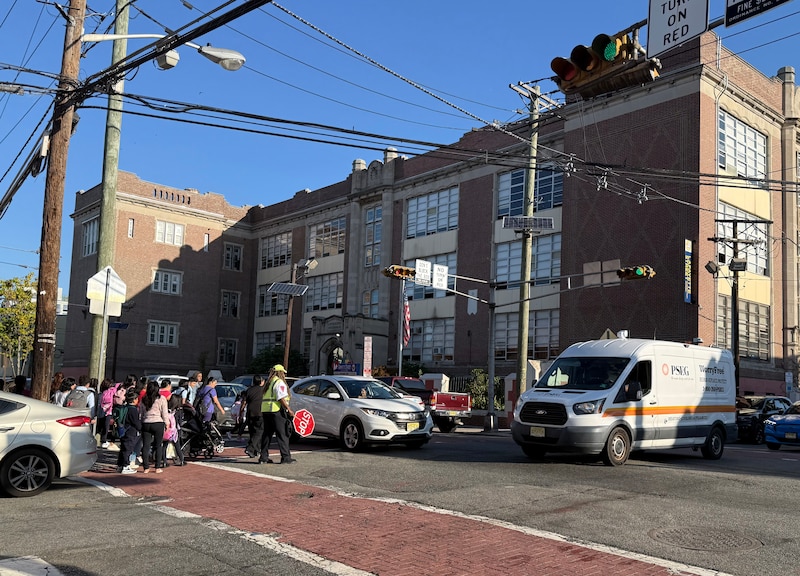
District leaders are also working with the state’s School Development Authority to replace 13 school buildings built before the 1920s, but the deal leaves out 20 schools that need to be replaced, district officials had previously said.
Last school year, León estimated that roughly $2.5 billion is needed to fix Newark’s dilapidated school buildings. After ruling out a bond to supplement the cost, district officials used some of their capital reserve funds to finance renovations for Newark Schools Stadium and the cafeteria at Sussex Avenue. It was the first time the district used some of its capital reserve funds to finance school renovations.
Newark is also bracing for the potential impacts of ongoing federal changes to education. At the start of the year, President Donald Trump signed an executive order designed to close the U.S. Department of Education. León in March said the district was aware of potential setbacks in federal funding and would make modifications and pivot as needed, but provided no details about its plans to address potential federal cuts.
On Tuesday, as the opening bell at the School of Architecture rang at 8:15 a.m., parents chatting outside began to disperse. They hugged goodbye and wished each other a smooth start to the school year.
Jessie Gómez is a reporter for Chalkbeat Newark, covering public education in the city. Contact Jessie at jgomez@chalkbeat.org.

